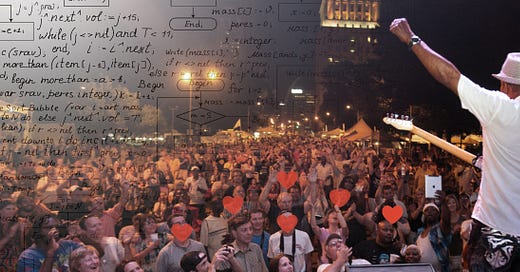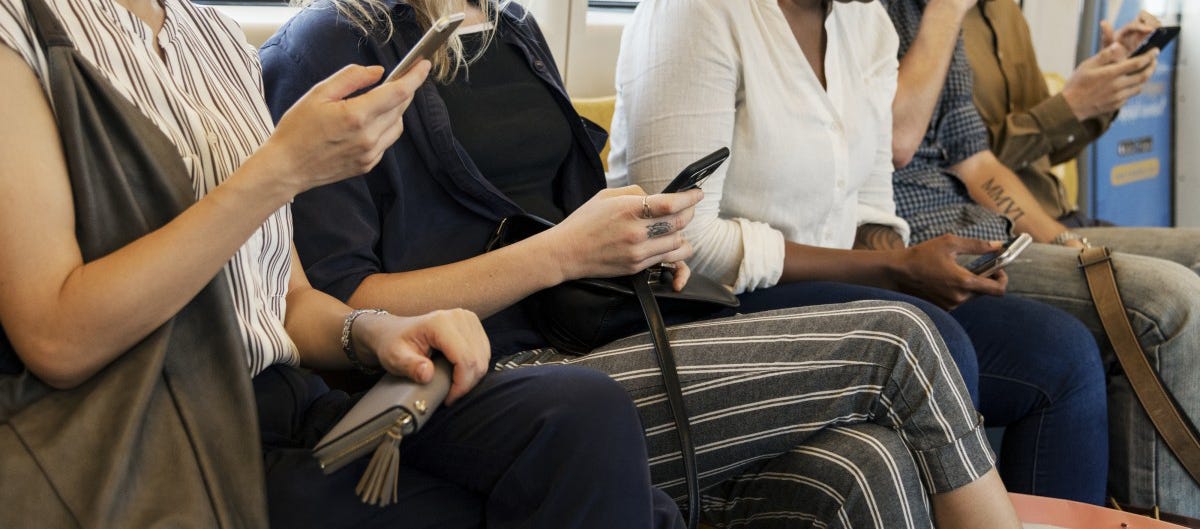"The feeling of 'bigness' is just the lie they sell you."
The sales pitch social media companies give to content creators.
It’s natural to compare yourself to others. But since the days when we were all insecure teenagers we are warned about the dangers of doing so. Seeking the regular approval of strangers can be even less healthy, because it gently leads to you modifying your behavior (and identity) into ways that might not align with your own satisfaction in life. You can find yourself living a life for others and their happiness instead of your own.
Social media has a way of sneaking in and hijacking this insecurity, causing us to become more performative, less sincere, less honest with ourselves and ultimately, less satisfied with our already insultingly brief lives. For generations people have been making the trade off to allow others to chip away at their souls in in exchange for money, but it turns out many of us don’t even need the money in order to put ourselves last.
Consider a (hypothetical) story of a painter. This artist for years has been making paintings that are foremost meaningful to them, as most artists do. They were not selling much, but the artist almost always felt that the people who purchased their paintings had a genuine connection and appreciation of the work. One day a friend recommended that this artist start posting their work to Instagram in order for it to connect with a wider audience. What artist doesn’t want their work to be seen?
Very quickly their account became reasonably popular. The artist was very happy for the increased appreciation and the elevated sticker prices on their work that came with it. Every now an then a post of theirs would “blow up” and go semi-viral, which always felt great. However, the specific posts that became popular often surprised the artist. There seemed to be no rhyme nor reason. They were not always the works that they were pouring their soul into. Often it was the more generic and accessible paintings that blew up. Sometimes it just seemed random. The artist grew frustrated trying to make sense of it. The algorithm truly worked in mysterious ways.
You might be able to see where this parable is going. Our painter is rewarded emotionally, not for making unique works that are deeply meaningful to themself, but for making simple, easily-digestible work to appear on other’s feeds just long enough to earn a “like”, and then probably not be looked at by that person again. It’s not to say the quality of the work has decreased, or that the artist is necessarily compromising their vision, only that they are emotionally (and financially) rewarded for prioritizing the algorithm. And the algorithm does not care about emotional depth, nuance, sincerity or understanding. It cares only for attention. It wants you, the scroller, to like everything you see, but only to consider it just enough so that you don’t stop scrolling.
You can forgive an artist for over time, consciously or not, being worn down by this feedback loop. Why make work that fewer people will see? Work that will get fewer likes? Nobody wants fewer likes. But it’s easy to see how this could slowly and unconsciously nudge an artist over time into a life of making work that’s no longer as meaningful to them.
I came across a reddit thread recently, titled “Being an Internet micro-celebrity fucked me up mentally.” The person describes their social media use:
In college I had somewhat popular Twitter and Tumblr accounts because I had social anxiety, an Internet addiction, and a lot of strong half-formed political opinions. Towards the end, though, I started to dislike how it was affecting my worldview and social skills. I was becoming mean, critical and anti-social.
Over time, in an effort to help with their anxiety, this person curated their social media accounts to only follow close friends and family, and put effort into reducing the time they spent on the apps.
So a few years ago I started cutting my time online by a lot to wean myself off social media. And it worked! However... I didn't realize how much smaller my world would feel.
They go on to describe this hole in their life that used to be filled with hundreds of strangers every day to “only 3-5 loved ones” and how their world feels significantly smaller.
However it’s not the post itself that really resonated (though it does illustrate the dangers of living a life regularly seeking the shallow attention of others online) it’s the top comment from user dethbudgie42069:
”Important to remember that the old feeling of "bigness" was just the lie they sold you.”
They go on:
“Make your life big. Live it. Travel. Actually experience the things your echo chamber hid you from.”
This is that same lesson we are told in our insecure high school days: don’t worry about what others are doing, live for yourself. Only you get to decide what’s worthwhile in your life. This is true! And it is genuinely good advice that can lead to a more meaningful life. But something often left out is that “making your life big” takes time. It takes care. It takes effort. Social media attention requires none of those things. In fact it rewards the upload of spontaneous funny/interesting moments that may just happen to go viral. There’s a slot-machine analogy you’ve probably heard before (usually presented from the content consumer’s viewpoint) that scrolling through Instagram is like gambling because you “never know what’s next, and it could be good!” what goes viral feels spontaneous, but it’s still guided by the algorithms, the same way the house knows it will win 51% of the time.
“If you don’t play, you won’t win, so play often and never stop”
The gambling analogy applies to the creators as well. Instead of inserting a token, you’re posting photos and videos of your life. Instead of a chance at money, what you’re getting is a chance for attention. Not meaningful, sincere consideration of your work- but dozens, or even thousands, of quick, barely-interested glances from people probably on the toilet, or waiting in line somewhere. People who are only looking at your posts because it’s marginally more enjoyable than whatever the thing is they’re doing at the time. And let’s be honest, they’re probably just addicted to the scrolling.
“Likes”, are not the same thing as a real human being actually appreciating what you’ve made. At the beginning that isn’t always obvious, but over time that superficiality can become more clear, and the positive attention can feel increasingly shallow.
So what happens to the people who actually do make it relatively big in the social media world? The people who seem to have found a slot machine that pays out? As evidenced by the poster on reddit, their anxiety and depression goes up. They become dependent on the shallow feedback, and when it’s gone it makes the real world feel small and disconnected.
The promise that you too, could be suddenly made “big” overnight is the sales pitch from these platforms to creators. But it’s not “big” for the right reasons. And the feeling of “bigness” provided by social media isn’t really the same as the feeling of “bigness” that comes from investing in yourself. When you modify your behavior to cater to an algorithm, it’s the algorithm that benefits in the long run. There is no slot machine that pays out 51% of the time. The house always wins, make your life big instead.







